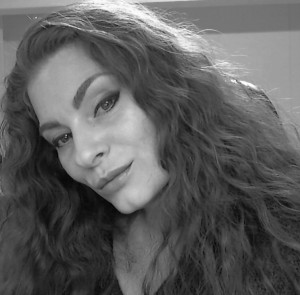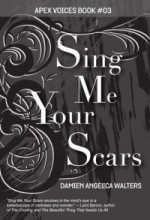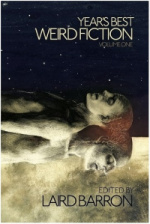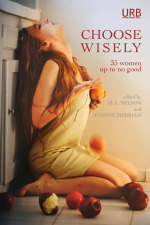 Damien Angelica Walters’ short fiction has appeared or is forthcoming in various anthologies and magazines, including The Year’s Best Dark Fantasy & Horror 2015, Year’s Best Weird Fiction Volume One, Cassilda’s Song, Nightmare, Strange Horizons, and Apex. “The Floating Girls: A Documentary,” originally published in Jamais Vu, is on the 2014 Bram Stoker Award ballot for Superior Achievement in Short Fiction.
Damien Angelica Walters’ short fiction has appeared or is forthcoming in various anthologies and magazines, including The Year’s Best Dark Fantasy & Horror 2015, Year’s Best Weird Fiction Volume One, Cassilda’s Song, Nightmare, Strange Horizons, and Apex. “The Floating Girls: A Documentary,” originally published in Jamais Vu, is on the 2014 Bram Stoker Award ballot for Superior Achievement in Short Fiction.
Sing Me Your Scars, a collection of her short fiction, is out now from Apex Publications, and Paper Tigers, a novel, is forthcoming from Dark House Press. You can find her on Twitter @DamienAWalters or online at http://damienangelicawalters.com.
What do readers need to know about Damien Angelica Walters, and which story of yours would you recommend to a new reader?
DAW: I fear I’m much like most writers—an introvert, a bookworm, a drinker of too much coffee, and a fan of dinosaurs and Alien.
For those unfamiliar with my work, Like Origami in Water would be a good story to start with, I think. It’s an older story and while my authorial voice has matured a bit, I think it showcases the tone of my short fiction well. It’s short, too, at just about 1,500 words, so it’s a quick read.
Who were/are your literary heroes/influences?
DAW: Joyce Carol Oates, Stephen King, Shirley Jackson, Mary Shelley, Margaret Atwood, Peter Straub, Ray Bradbury, Jacqueline Carey, Gillian Flynn, Cormac McCarthy, Kij Johnson, Catherynne Valente, Kelly Link, Laird Barron, John Langan, and Ken Liu are some of the writers who’ve either inspired me or influenced me or left me in awe of their skill. Genre fiction holds a jaw-dropping wealth of talent.
Where did the inspiration for Sing Me Your Scars spring from? 
DAW: Do you remember all those hateful memes about real women? Real women look like this, no, they look like that… For a time it felt like I saw a different one every day (mostly posted by men), all with this perceived ideal of feminine perfection and each time, my frustration grew. That frustration turned into a sentence – This is not my body. – and then into a paragraph and then into the story itself.
What was the story/book that made you think ‘I want to write!’?
DAW: I don’t think it was one specific book, but a cumulative effect of everything I read, both genre and non-genre, both good and bad. I remember creating illustrated books when I was in third grade and trying to sell them to the other kids in the neighborhood. While I’m fairly certain the books were about ghosts and other creepy things, sadly, none of them survived my childhood.
Name five fictional characters you’d invite over for coffee and cake?
DAW: Phèdre nó Delaunay de Montrève from Jacqueline Carey’s Kushiel’s Dart, Offred from Margaret Atwood’s The Handmaid’s Tale, the nameless main character from Jacqueline Harpman’s I Who Have Never Known Men, Rose McClendon from Stephen King’s Rose Madder, and Ludwig Von Sacher from Kirsten Bakis’ Lives of the Monster Dogs.
 Are there any of your own characters that you think you’d like to revisit in longer form at some point?
Are there any of your own characters that you think you’d like to revisit in longer form at some point?
DAW: I’ve been toying with the idea of turning The Floating Girls: A Documentary into a novel, but at this point I’m still jotting ideas down to see if it’s viable or not. My fear is that even with the addition of new characters and a larger storyline comprised of events that occur before and after the events in the short story, the central story won’t translate well to a longer work.
What first drew you to write horror rather than any other genre?
DAW: It wasn’t a conscious choice, to be sure, but I grew up reading fairy tales and Lois Duncan and when I was eleven, I read Stephen King’s The Shining. Given that my tastes as a reader always skewed to the dark, it was a given that what I wrote would follow suit.
Who’s your favourite villain in fiction?
DAW: That’s a hard question to answer. I think it’s a tie between Coleman Collins from Peter Straub’s Shadowland and the Overlook Hotel in Stephen King’s The Shining. Uncle Cole should be all magic tricks and letting the boys stay up too late with ice cream for dinner and cake for desert; he shouldn’t be crucifixion and mermaid girls and glass birds.
And the Overlook should be rooms and ugly carpet and a big kitchen; it shouldn’t be blood on the walls, fire extinguishers that become snakes when you’re not looking, and it most definitely should not be able to exploit your father’s greatest weakness and turn him against you.
What’s your favourite short story ever and why? 
DAW: Another tough question, and I’m going to cheat a bit and give you two. As far as the classics go, I’ll say The Lottery by Shirley Jackson. It’s masterful the way it draws you into a seemingly normal village, even if the gathering of the stones is disquieting. But the townspeople don’t seem worried overmuch, so it’s easy to brush that off. The story pulls the rug out from under you by slow degrees and then at the end, it leaves you suspended in the air and ready to drop with Mrs. Hutchinson. The slow burn coupled with keeping the carnage off-screen works beautifully.
For newer fiction, Spar by Kij Johnson is brilliant. If you read it quickly, you might be inclined to dismiss it as vulgar or tentacle porn, but if you read it closely, you see the true story underneath. It’s about communication, or the lack thereof, and how destructive, how paralyzing, that can be. It’s masterful.
 What’s next for Damien Angelica Walters?
What’s next for Damien Angelica Walters?
DAW: I have several short stories and a portmanteau novel currently in the works. I’m also trying to plot another novel about monsters, love, hate, and revenge. I’ve never plotted a novel before so I may or may not be successful, but my novel first drafts are always a mess and I’d love to find a way to make them a bit cleaner.
Publication-wise, Paper Tigers, a novel, will be out later this year from Dark House Press, and I’ve short fiction forthcoming in several anthologies and magazines, including Cassilda’s Song, edited by Joe Pulver, a King in Yellow anthology of all new stories written by women, The Mammoth Book of Cthulhu: New Lovecraftian Fiction, edited by Paula Guran, and Black Static.

